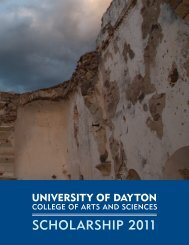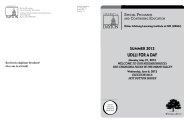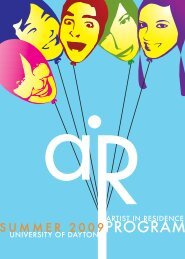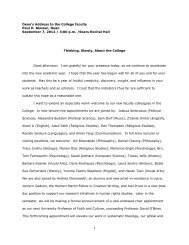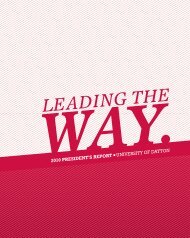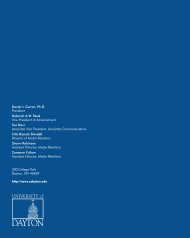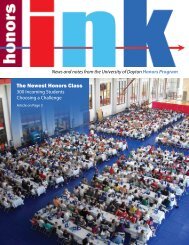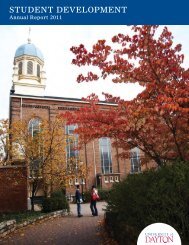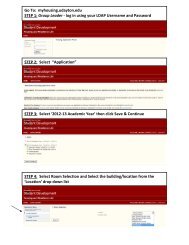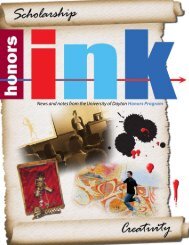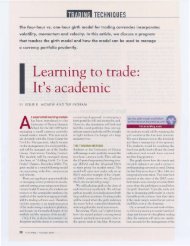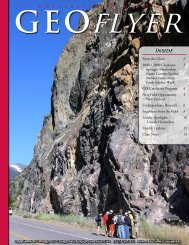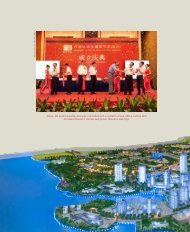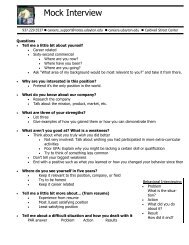Stander Symposium abstract book - University of Dayton
Stander Symposium abstract book - University of Dayton
Stander Symposium abstract book - University of Dayton
You also want an ePaper? Increase the reach of your titles
YUMPU automatically turns print PDFs into web optimized ePapers that Google loves.
Learning as a Way <strong>of</strong> Service<br />
Presenter(s): Gabrielle M Gloekler<br />
Advisor(s): Lori G Phillips-Young<br />
English - Independent Research<br />
POSTER SESSION 2<br />
The Sophomore Social Justice Service Learning Community(SSJSL)has a mission is to promote literacy. The SJSLC’s community partner, the nonpr<strong>of</strong>it<br />
organization Project READ, trains volunteers to tutor students in grades K-8 and young adults. After receiving my training, I was assigned a<br />
tutoring position with a girl in second grade at Holy Angels. My work including helping her one-on-one with mathematics, spelling, and grammar<br />
skills in ways that would help her to better understand essential educational concepts in those subject. I appreciated being able to be a part <strong>of</strong><br />
promoting literacy and helping the faculty with their afterschool program. Service learning is one way to learn as well as serve our community. It<br />
is also an opportunity to apply the Marianist ideals <strong>of</strong> lead, learn, and serve.<br />
Learning by Serving Others<br />
Presenter(s): Jill M Smith<br />
Advisor(s): Lori G Phillips-Young<br />
English - Independent Research<br />
The Sophomore Social Justice Service Learning Community (SSJSL) has a mission is to promote literacy. The SJSLC’s community partner, the nonpr<strong>of</strong>it<br />
organization Project READ, trains volunteers to help tutor students in grades K-8 and young adults and those students striving to learn<br />
English as a second language. After training, I was assigned an afterschool tutoring position with a first grade student named Elijah at the Westminster<br />
Presbyterian Church in downtown <strong>Dayton</strong>. Together, we would work on worksheets and work<strong>book</strong>s that focused on spelling and reading.<br />
We focused on letter combinations and the sounds that they made. In order to make it easier and more enjoyable for him, I would let him practice<br />
on a dry erase board and draw pictures to help him remember. Elijah enjoys drawing so this was a good learning tool for him. On many afternoons<br />
his progress was evident because he was able to remember the majority <strong>of</strong> the words and sounds that we had reviewed during that session. If<br />
there was ever a time when he did not understand the concept, I would patiently explain it to him again but in a different way. For this reason,<br />
this was not only a good learning experience for him, but it also was a good experience for me because I was able to work on exhibiting patience<br />
and developing communication skills. In addition, it was also very rewarding for me to see how far he advanced throughout the time I spent with<br />
him. Service learning is one way to improve the literacy rates in our community. It was also an opportunity to help me apply the Marianist ideals<br />
<strong>of</strong> lead, learn, and serve to a real-life situation.<br />
Observing Communication Practices in the Davis Center for Portfolio Management<br />
Presenter(s): Jocelyn R Abron, George S Cressy, Gabrielle M Dimaio, Kevin O Martin<br />
Advisor(s): Amanda J Wright Cron<br />
English - Course Project, 12_SP_ENG_372_01<br />
Evaluating the role that communication plays in an organization achieving its primary goals has been <strong>of</strong> interest to scholars over the past 30 years.<br />
Particularly, Doheny-Farina’s (1986) Writing in an Emerging Organization discusses “how social and organizational contexts influence writing and<br />
how writing influences the organization”(p. 160). This study aims to observe communication and its roles in this pr<strong>of</strong>essional academic atmosphere.<br />
The group will then develop a proposal to the organization to help them in their communication process. The group will collect written materials,<br />
observations <strong>of</strong> daily and special events, and audio recordings <strong>of</strong> both Davis Center meetings and interviews with Davis Center members.<br />
Written materials collected may include, but are not limited to, the following: center-wide issue-addressing emails from the management team or<br />
the Center director; team memos for general information; Center advertising materials meant for nonmember populations; and research reports<br />
pertaining to the primary function <strong>of</strong> the Davis Center’s work. Nonintrusive observing <strong>of</strong> verbal communication among Davis Center members will<br />
be noted. Particularly, horizontal and vertical communication within the Center’s hierarchy will be evaluated (Spinuzzi, 2007). Audio recordings <strong>of</strong><br />
anonymous interviews <strong>of</strong> randomly selected Center members and Center management will be taken for later study. If permitted, audio recordings<br />
<strong>of</strong> full staff Center meetings and special team meetings will also be recorded for study.Expectantly, this study will come to fruition with some<br />
proposals for the Davis Center with regard to bettering their communication practices. This group expects to give concrete suggestions for more<br />
effective verbal and written communication.<br />
83



